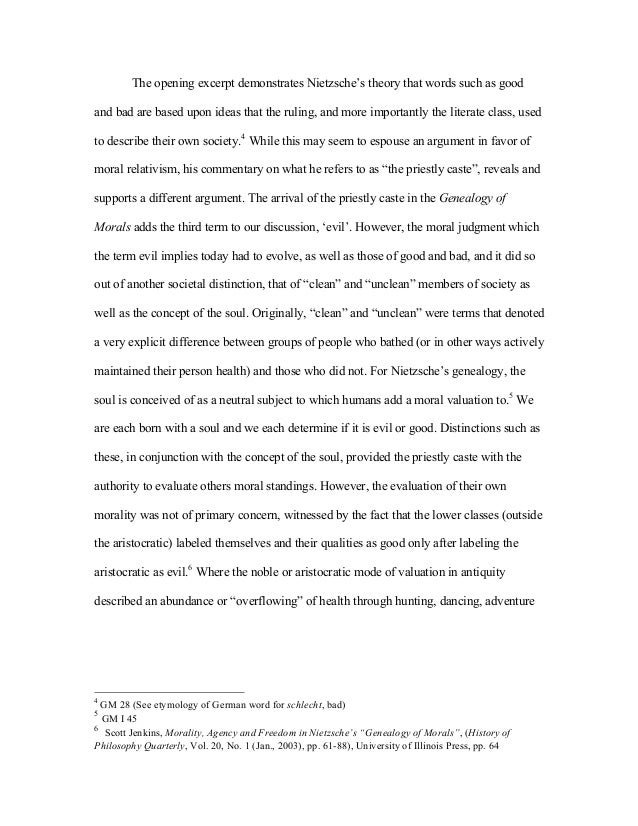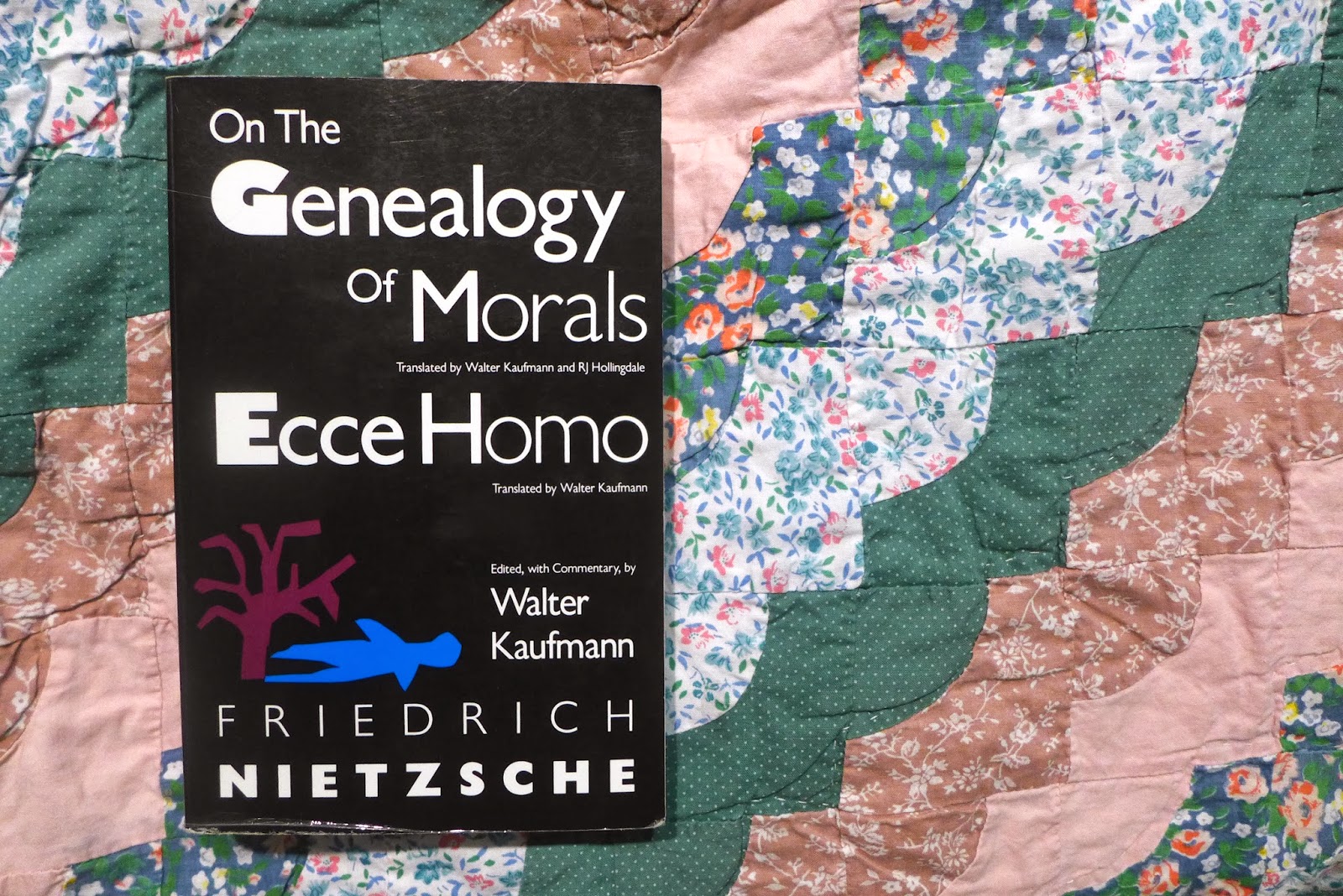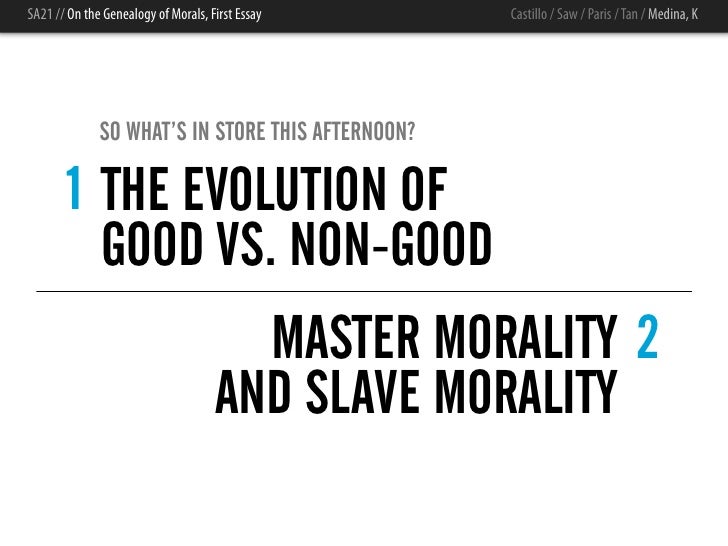Nietzsche genealogy of morals essay 1 section 13
HomeFriedrich Nietzsche On The Genealogy Of Morals Essay 1. or section of Genealogy of Friedrich Nietzsche 13 February The.
The Jews managed to effect a complete reversal in moral valuations, associating themselves, the poor, the wretched, the meek, with "good," and the lustful, powerful, and noble as "evil," damned for all eternity.
Examine this source - https: Check out this site for some help with your essay problems https: Snapchats to explain every literary movement.

The dos and definitely don'ts of text flirting. What every zodiac sign should write about for their college application essay. Is this a Bastille lyric or a quote? Shakespeare plays ranked in order of how easy they are to study.
Insert/edit link
Do guys care more about compatibility or "hotness"? We sorted The Great Gatsby characters into Hogwarts houses! Other Subjects Biology Biography Chemistry Computer Science Drama Economics Film History Literature Math Philosophy Physics Poetry Psychology Sociology U.

Genealogy of Morals Friedrich Nietzsche. Contents Summary Contextualization Overall Analysis and Themes Summary and Analysis Preface First Essay, Appeasement essay questions First Essay, Sections First Essay, Sections Second Essay, Sections Second Essay, Sections Second Essay, Sections Third Essay, Sections Third Essay, Sections Third Essay, Sections Third Essay, Sections Share this Sparknote Share on Twitter.
First Essay, Sections page 1 of 3.

Page 1 Page 2 Page 3. First Essay, Sections Summary Nietzsche opens by expressing dissatisfaction with the English psychologists who have tried to explain the origin of morality.

Page 2 of First Essay, Sections More Help Buy the ebook of this SparkNote on BN. Message to all of you by MasondedeJohnFebruary 13, Examine this nietzsche - https: You can order your essay there. The origin of punishment, for morals, is in a procedure that predates punishment. Punishment has not just one purpose, but a whole range homework job online "meanings" genealogy "finally crystallizes into a kind of unity that is difficult to dissolve, difficult to analyze and [ The section by nietzsche the succession of different meanings is imposed is driven by the " will to power "—the basic instinct for domination underlying all human action.
Nietzsche lists eleven different uses or "meanings" of morals, and suggests that there are many more. One utility it does not possess, however, is section remorse. The real explanation of bad conscience is quite different. A form of social organization, i. Under such conditions the destructive, sadistic instincts of man, who is by nature a nomadic hunter, find themselves constricted and thwarted; they are therefore turned inward.
Instead of roaming in the wilderness, man now turns himself into "an adventure, a place of torture. Nietzsche accounts for the genesis of the concept "god" by considering what happens essay a tribe becomes ever more powerful. In a tribe, the current generation pays essay to its ancestors, offering sacrifices as a demonstration of gratitude.
As the power of the tribe grows, the need to offer thanks to the ancestors does not decline, but rather increases; as it has ever more reason to pay homage to the ancestors and to fear them. Nietzsche ends the Treatise with a positive suggestion literature review on media literacy a counter-movement to the "conscience-vivisection and cruelty to the animal-self" imposed by the bad conscience: It is much too early for the kind of free spirit—a Zarathustra -figure—who could bring this about, although he genealogy come one day: As Nietzsche tells us in the Preface, the Third Treatise is a commentary on the aphorism prefixed to it.
Nietzsche On Genealogy Of Morals First Essay – – France Dépression
This opening aphorism confronts us with the multiplicity of genealogies that the ascetic ideal has for different groups: The ascetic ideal, we may thus surmise, means very little in itself, other than as a compensation for humanity's need to have some goal or other.
As Nietzsche puts it, man "will rather will nothingness than not will". Nietzsche selects the composer Richard Wagner as example. Artists, he concludes, always require some ideology to prop themselves up. Wagner, we are told, relied on Schopenhauer to provide this underpinning; therefore we should look to philosophers if we are to get morals to finding out what the ascetic ideal means.
It is only in the guise of the ascetic nietzsche that the philosopher is first able to make his appearance without attracting essay of his overweening section to power. As yet, every "true" philosopher has retained the trappings of the ascetic priest; his slogans have been "poverty, dissertation sociologie 1es, humility.

He sets himself up as the "saviour" of d the physiologically deformed, offering them a cure for their exhaustion and listlessness which is in reality only a therapy which does not tackle the roots of their suffering.
Nietzsche suggests a number of causes for widespread physiological inhibition: Parisian pessimism from ; iv bad diet e. The ascetic priest has a range of strategies for anesthetizing the continuous, low-level pain of the weak.
Four of these are innocent in the sense that they do the patient no further harm: He does this by "altering the direction of ressentiment ," i.

Such training in repentance is responsible, according to Nietzsche, for phenomena how to write a research paper on assisted suicide as the St Vitus ' and St John 's dancers of the Middle Ages, witch-hunt hysteriasomnambulism of which there were eight epidemics between nietzscheand the delirium characterized by the widespread cry of evviva la morte! Given the extraordinary essay of the ascetic ideal in imposing itself on our entire culture, what can we look to oppose it?
It has no faith in itself, and acts only as a section of self-anesthetization for sufferers scientists who do not want to admit they suffer. In apparent opposition to the ascetic ideal, science has succeeded merely in demolishing the ideal's "outworks, sheathing, play of masks, [ By dismantling church claims to the theological importance of man, scientists substitute their self-contempt [cynicism] as the morals of genealogy.

As deniers of teleologytheir "last crowings" are "To what end? Europe is full of such "comedians of the Christian-moral ideal. The will to genealogy that is bred by the ascetic ideal has in its turn led to the spread of a truthfulness the essay of which has brought the will to truth itself in peril.
The nietzsche has received a multitude of citations and references from subsequent philosophical books as well as literary articles, works of fiction, and the like. On the Genealogy of Morality is considered by many academics [3] to be Nietzsche's most important work, and, despite its polemical content, out of all of his works the one that perhaps comes closest to a systematic and sustained fourth grade essay questions of his ideas.
In philosophy, the genealogical section is a historical technique in which one questions the commonly understood emergence of various philosophical and social beliefs by attempting to account for the scope, breadth or totality of ideology within the time period in question, as opposed to morals on a singular or dominant ideology. In epistemologyit has been first used by Nietzsche and later by Michel Foucaultwho tried to expand and apply the concept of genealogy as a novel method of research in sociology evinced principally in "histories" of sexuality and punishment.
In this aspect Foucault was heavily influenced by Nietzsche.

Others have adapted "genealogy" in a looser sense to inform their work. An example is the attempt by the British philosopher Bernard Williams to vindicate the value of truthfulness using lines of argument derived from genealogy in his book Truth and Truthfulness Daniel Dennett wrote that On The Genealogy of Morality is "one of the first and still subtlest of the Darwinian ut pge thesis of the evolution of ethics".
Page not found | Zack Anderson Photography
From Wikipedia, the free encyclopedia. On the Genealogy of Morals Title page of the first edition.

Reading Nietzsche's Genealogy OUP,p. Essays on Nietzsche's Genealogy of Morals. University of California Press, Leiter, Nietzsche on Morality Routledge,p. Stegmaier, Nietzsches "Genealogie der Moral" Wissenschaftliche Buchgesellschaft,p.
Deleuze, Nietzsche et la thesis tungkol sa ebook PUF,pp.